#this is going to be really abstract and nihilistic because it's mahito
Explore tagged Tumblr posts
Note
What do you think of Mahito, his role in the story's future, and what he might represent? I can't stop thinking of how he literally acts as an antithesis to Yuji (besides being his primary foil), humanity and the narrative itself and how that might mean that he is the main antagonist of Jujutsu Kaisen.
What are your thoughts on the new JJK chapter? With what Mahito said to Yuji at the start of the chapter?
Answering these asks together. Thank you both for sending them!

I’m going to center this analysis around Mahito’s statement that you are me, and his role as antithesis to Yuji as the anon stated above. There are two big ways you can interpret Mahito’s statement. They are the same in the sense that they are character foils, that Mahito is the Jungian Shadow to Yuji and all of his actions. The second one is based around the idea that Jujutsu Kaisen at large plays with Budhism, and BUdhist ideas, it’s an argument that Mahito and Itadori are spiritually the same. Not contradictory forces but complimentary, the whole of them each containing parts of the other. I’m not the best at explaining japanese budhism, because I myself am not a japanese budhist, but I will try my best under the cut.
1. Spiritually the Same
So, Mahito’s arguments are ones that require a certain amount of abstraction to make sense.
For example, is saving people the same as killing people? No, obviously not.
Alright, there’s your answer. Let’s go home, give me notes please. To understand Mahito’s argument you have to understand how far away from other living people his perspective is.
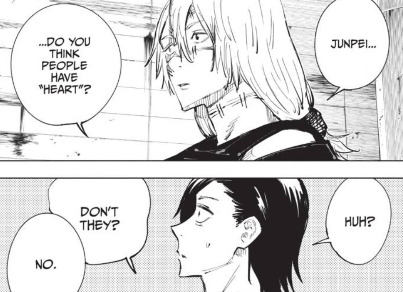
Mahito positions himself as a third party observing from afar. From his position everything has a tendency to look the same. Let me explain: if every living creature has a soul, then what gives weight to human souls?
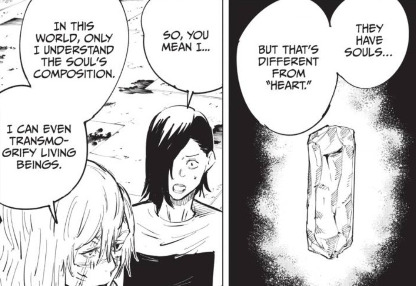
Heart, weight, both of those are words that are essentially trying to give human lives “worth.” Are human lives “worth something?” Are they more worthy than the lives of animals, plants, curses, etc. The way Mahito sees it everything has a soul. Even plants have a soul. However, there’s nothing too different in the souls of humans, from the souls of say bugs. The only difference he himsel sees is that humans have a capacity for reason.

“The so-called dignity obtained by human reason”, humans assume their lives are more worthwhile, more dignified then say, the life of your dog, because a human has the intellectual capacity for logical reasoning and a full range of emotions on display, and your dog has been barking at his reflection in the mirror for twenty minutes because he thinks it’s another dog.
Ideas of good and evil are not natural laws of the universe. They are made up by human reason. They only exist because humans said they do, and give reasons to them. Mahito’s perspective is a natural one on the world.

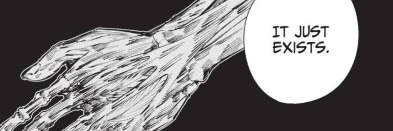
The reason that humans are different from monkeys is just a quirk of evolution that enabled them to gain more brain mass over millions of years, and then gained higher amounts of intelligence. Everything else was reasoned out, ex posto facto. Humans come up with reasons why things happen after the fact, but they just happened. Humans just happened to evolve.
If the natural state of the universe is chaos, and there’s no foreseen hand guiding everything, then things that happen just happen. There is no particular meaning to them. You can make up a meaning, but who is to say one invented meaning is more important than the other?
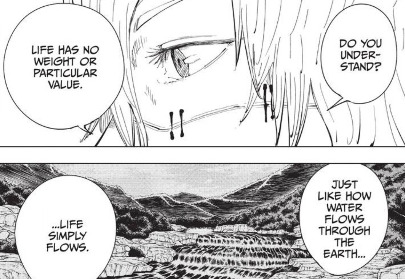
There’s life on this planet, because we just so happened to be a certain distance away from the sun to enable an ideal climate for liquid water on the surface. Therefore, life is not some necessarily some thing that needs to be protected. It’s just there.
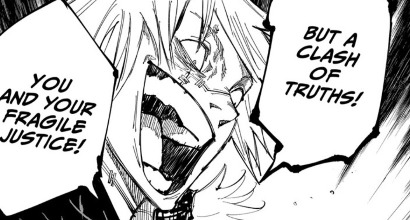
If both Mahito and Yuji are fighting up with their made up value of life, Mahito believing there is no value, and Yuji believing there’s value worth preserving, then Yuji needs to actually make an argument. If no objective right or wrong exists, Yuji needs to prove why he’s right, rather than insisting he’s doing the right thing without thought.
Yuji and Mahito are each other, because they both embody an ideal in the way life should be treated.

When Mahito is saying this, it’s because Yuji gives weight to human lives, but not weight to the light of curses. That is to say, Yuji is fixated on the idea of giving humans a “good death” because he believes they’re owed that dignity, but will absolutely brutalize and tear curses to pieces. This is something Gojou commented on in chapter three, HUH ISN’T IT WEIRD THAT YUJI DIDN’T REALLY GROW UP SURROUNDED BY CURSES AND ALL I NEEDED TO DO WAS GIVE HIM A KNIFE AND POINT AT THAT AND SAY GO KILL THAT THING AND HE DID IT.
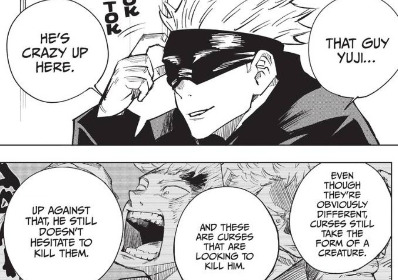
Let’s say it wasn’t a curse for a moment. Let’s say Yuji wrestled and killed a tiger with his bare hands and afterwards you saw him skinning it. From a certain perspective his actions might look brutal. You killed and skinned a cat. Well, yeah, but I wouldn’t do this to a human. From a certain perspective his actions might look justified. There was an old lady nearby and I didn’t want to maul her. However, if you believe spiritually that humans are nothing special and all living things have equal dignity, Yuji killing and skinning that tiger is a violation of that dignity.
Yuji believes that humans have dignity and wants to perserve that dignity even in death. That’s not objective fact though, that’s his own personal belief that he’s fighting for.

The official translation even has Yuji call it a natural death rather than a good death. However, is Yuji just imposing what he believes to be good and insisting it’s the natural order of the world instead?
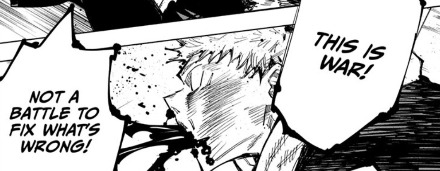

Mahito’s argument is essentially that there is no right or wrong, and therefore the two of them are just both presenting ideas. If the order of the world is one where creatures constantly consume each other in order to survive, then what is so wrong about the curses fighting it out with humans against who becomes top dog? Curses are shown to have sentience same as humans. They don’t have human kindness, or compassion but they’re capable of assigning thoughts, and reasons behind their actions the same way humans do. What makes one life more worthy for another? Mahito’s words are a challenge, to come up with some reason to defy him.
However, there’s a flaw in Mahito’s argument.

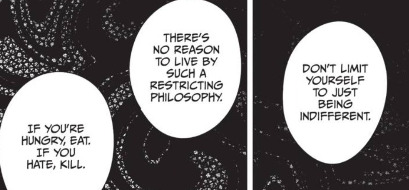
Mahito’s argument is one that states nothing is a reason. All life is equal therefore one life doesn’t matter or is worth more than the other. However, then he uses that to give himself moral permission to do whatever he want.
What do I mean by he needs moral permission?
Mahito is justifying his actions, excusing his actions, the same way that Yuji is.

The appearance of the black flash this chapter signifies that the universe is a neutral party to both Yuji and Mahito’s fight. The universe is indifferent to both of them. However, Mahito presents himself as someone who is also indifferent, and objective, when he’s not.
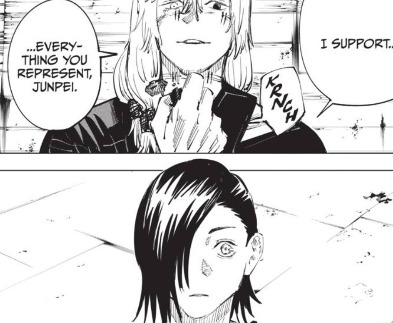
Mahito isn’t doing what he does for no reason at all. Mahito does it because he loves humans, while Yuji does it because he hates humans. Mahito tries to give permission to Junpei, he tries to give permission to himself. His views are not that of a true nihilist, because a nhilist wouldn’t seek permission like that. Mahito’s are that of a moral nihilist. All life is worthless, therefore I can do whatever I want with it. That’s not an expression of nihilism, or the abstract idea that there are no set goals or values to life. That’s just Mahito giving an excuse to why he wants to toy around with human life.
(Also, I don’t really understand japanese budhism from the perspective of a japanese person, so please feel free to correct me on any of this, I’m just trying to go off of what was presented in the story! I’d love to hear other people’s perspectives).
But basically what I’m talking about is expressed here by Mr. Yoshimura if you read Tokyo Ghoul.

If all life on this planet is just trying to survive, and in compettition with one another to survive, then the taking of all life is equally evil. A human killing a curse for survival, and a curse killing a human for survival is the same FROM THAT PERSPECTIVE.
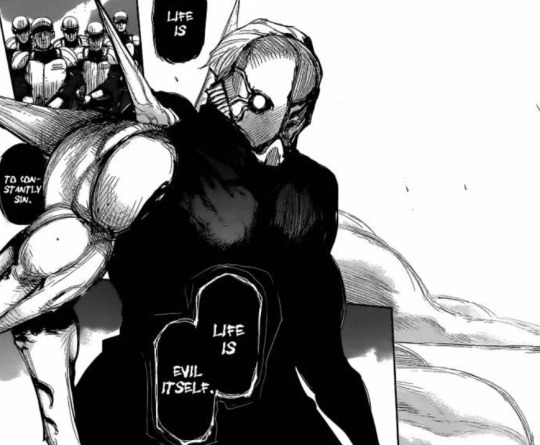
However, I would argue that this assertion that “Life is Evil” is being said by a PERSON and that person is making a VALUE JUDGEMENT. Evil is an idea same as good. Life is neutral, life is random, life is indifferent, life is just atoms smashing around in pure utter chaos but it’s not necessarily evil and definitely not in the way Mahito takes it to be.
2. We’re like the Same Dude
The second is that Mahito and Yuji are character foils. They are characters in a narrative who are meant to reflect each other, specifically that of the protagonist, and their shadow.
Jung stated the shadow to be the unknown dark side of the personality. According to Jung, the shadow, in being instinctive and irrational, is prone to psychological projection, in which a perceived personal inferiority is recognized as a perceived moral deficiency in someone else.
If Yuji and Mahito were two parts of the same whole person, like two halves of the brain, Yuji would be the sensible, reasonable half, and Mahito would be the one acting on pure emotion and instinct.
Mahito and Yuji are both curse/human hybrids. They are both individuals that blur the line between humans and curses. Mahito is specifically, a curse that was created from the human fear of one another which makes him the most human of the curses and the most adept to change or growth. Yuji is a normal kid (as far as we know) who swallowed a finger, and his entire body became curse energy. He is half curse, and half human, in the regard that he is Sukuna and he is Yuji at the same time.
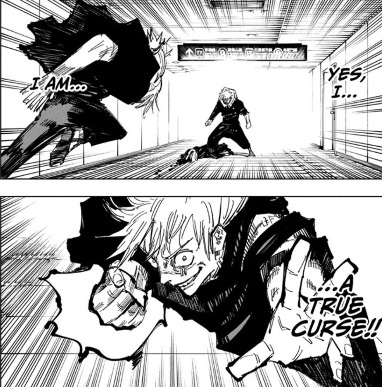
Yuji and Mahito are people who both embody a vague area between human and curse, a curse that acts like a human, a human that acts like a curse in vice versa, however they choose to cling onto different apsects of their being. It’s ambiguous whether or not Mahito is a humanlike curse, but Mahito himself defines himself as only ever being a curse. Just like Yuji sees himself as a human too, he sees himself as Yuji, and not Yuji and Ryomen Sukuna at the same time.
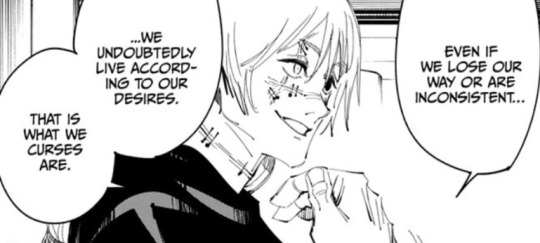
It’s Mahito who encourages the others to act more like curses, to live on impulse than desire, instead of trying to restrain themselves for the sake of reason. However, this is ironic, because the reason that Mahito is getting raised up as the leader of the curse family is because he is the mirror to humans, and is the most humanlike of all the curses.

Mahito wants to be a pure curse, but his path requires him to become more and more human. Yuji wants to be a pure human, but his path in ingesting fingers will require him to become more and more curselike as time progresses. He will over time become more Ryomen Sukuna and less Yuji Itadori until the time comes for him to be executed after ingesting all twenty fingers. They are like opposite reflections in the mirror, clinging onto opposite parts of themselves.
It’s even shown in their foiling in the Junpei arc. They both encourage Junpei to do the opposite things. Mahito encourages Junpei to follow his baser instincts and curse other people, to resent them for what they have done to him.
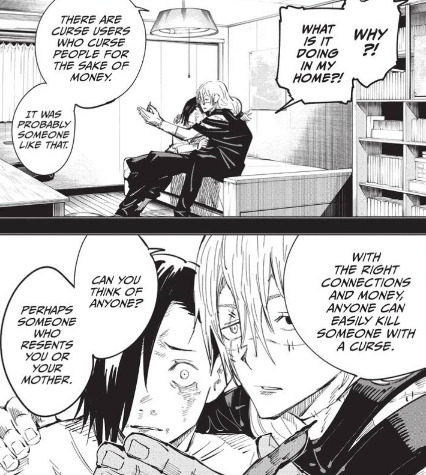
Yuji however, applies to Junpei’s sense of reasoning and higher thinking. He suggests there’s a better plan than Junpei’s simple acting on. He asks Junpei not to do what he thinks is best in the moment and lash out on those feelings alone like Mahito suggested, not to follow his instinct to curse, but rather try to follow reason to find who is really at fault and then punish the correct person. Yuji appeals to the fact that Junpei have both empathy for the people he’s randomly lashing out at over his own pain, and that he has the ability to separate himself from his pain and try to search for what’s right instead.

These are opposite ideas, and Mahito and Yuji clearly look at the world with completely opposite perspectives. However, these perspectives don’t contradict, they are complimentary. The existence of a shdaow doesn’t mean the conscious mind is right. The existence of the consious mind doesn’t mean the shadow isn’t there. In other words, light and shadow don’t negate each other, light cannot exist without shadow.
In less poetic words. Whenever you make any action, your good intentions are equally as valid as your bad ones. There’s no such thing as a person without bad intentions. Anything can be seen from a both good and bad light. What Mahito argues to Yuji, is that Yuji was ignoring all along how dangerous an individual he was. Yuji uses his powers to save people, and he wants to become strong, but as has been pointed out in the manga before having all that strength collected in one person can be used oppressively and violently.
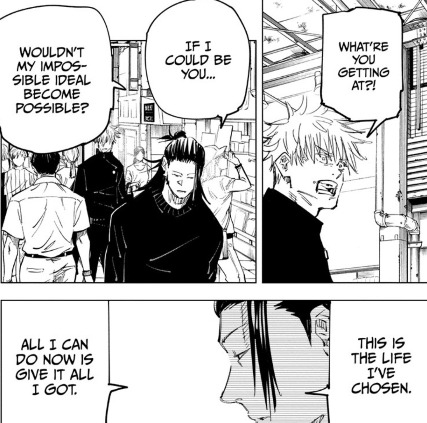
This is what Getou says to Gojou. If he was Gojou he’d have the power to kill every last human being alive and spare only the sorcerers. Gojou is someone sitting on all that power. Power alone doesn’t justify itself. Equally as important is the choices and the reasoning behind wielding that power. What Mahito was pointing out, and what the plot is emphasizing is that Yuji was wielding that power, especially the power of Ryomen Sukuna in a way that was poorly thought out.


Which is the point of this scene when Yuji realized the scope of Sukuna’s rampage. Yuji didn’t seriously think of the possibility that he was a walking bomb waiting to go off. This was brought up as an argument in the Kyoto arc, that it might be safer for everyone to just kill Yuji now so Sukuna doesn’t have the chance to get out. And then. Sukuna got out. And that’s what happened.
Mahito isn’t saying that Yuji is good or bad, he’s saying Yuji hasn’t thought about what good or bad even is. Yuji only ever saw the good intention of his actions, he saw himself as a person saving others, and because of that he didn’t think properly about the risk he inherently carrying. He didn’t realize how dangerous of a person he was for carrying Sukuna around like that. Mahito is the unacknowledged shadow of Yuji’s actions, following him through the plot, and punishing him for his ignorance.

Yuji is a good kid, but sadly the nature of the universe being true neutral good intentions don’t always lead to good results. It’s just a burden that Yuji has to think about, and carry with him as he moves on. Which I really, really want him to do. Yuji can think more, live on and live with his regrets, and still try to do the right thing even after enduring all of this because that’s what makes him human.
Just like how all reasons for fighting are made up, humans are able to make up whatever reason they want to keep fighting. It goes both way. If all lives have equal weight. You don’t have to take it from Mahito’s perspective that they’re worth nothing. You can also take it from Yuji’s perspective, that every life is worth fighting for, worth living, because you and I are worth just as much as one another.
#Anonymous#jjk meta#this is going to be really abstract and nihilistic because it's mahito#sorry#jujutsu kaisen meta#mahito#yuji itadori#itadori yuji#yuji analysis#yuji meta#metasks#jujutsu kaisen#jujutsu kaisen mahito#jujutsu kaisen theory
183 notes
·
View notes